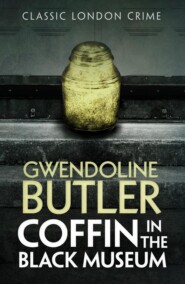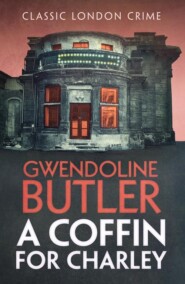По всем вопросам обращайтесь на: info@litportal.ru
(©) 2003-2024.
✖
Coffin Underground
Автор
Год написания книги
2018
Настройки чтения
Размер шрифта
Высота строк
Поля
Coffin saw his visitor to the front door. As he closed it behind Lane and walked up the stairs he had the feeling he got sometimes that wheels were moving. It was never a wholly pleasant feeling, unsettling and worrying.
Mrs Brocklebank would have called it ghosts, the spirits operating. But Coffin recognized it as human relationships interlocking and interacting and setting the machine in motion.
When you thought about it, it all came down to people.
He picked up the piece of paper again and held it to the table lamp. ‘Wait a minute. I didn’t look at this properly before and neither did Paul. Paul misled me and he misled himself. Not my address here. My number is 5 …’
He looked again. He could just make out that there was a faint number written there.
‘No. 22.’
Chapter Three (#ulink_dbac2cde-dabd-5e8a-bffa-e4fc7cec1a79)
The murder case slipped easily into its next phase, as if it had been programmed by a computer that had access to several personal files and knew where they interacted.
Coffin was still pondering on the significance of what he had seen written on the piece of paper from Place’s jacket. He had sent jacket and paper off to the laboratories, demanding an instant report. This had arrived and a copy had been sent to Inspector Lane. As far as they could tell, the writing, by a ballpoint, was Egan’s. The paper was of poor quality and had been torn off a pad of the kind you might keep in a kitchen or by a telephone. In Place’s pocket it had picked up fluff and minute scraps of human skin and hair. It had both Egan’s fingerprints on it and those of Place, blurred but identifiable.
At the same time a determined police search for Terry Place began in the area down by the river. It was neither quiet nor unobtrusive, since it was not intended to be. The aim was to frighten Place into acting hastily. Within a further twenty-four hours, his sister, Mrs Roxie Farmer, divorcee, was taken in for questioning at Royal Hill police station, but claimed she knew nothing. In spite of an onslaught by Inspector Paul Lane, she gave nothing away.
That is, until the very end of the interview. Lane had been assisted by a woman police officer, Detective-Sergeant Phyllis Henley, a thickset girl, whom he had called in because she was an old friend or enemy of Roxie whose own life had not been without criminal excitements.
On the table between the two police officers, in view of Roxie, lay the forensic report on the jacket found in Roxie’s house.
‘Come on now, Roxie, you know me.’ Sergeant Henley prided herself on her power to prise out information by a mixture of persuasion and light bullying like the icing on a cake, and although this had never worked particularly well with Roxie in the past, this was no reason not to try it now.
Roxie stayed silent as if she was determined not to be cozened, but she shifted uneasily in her chair.
‘You can trust me.’ Roxie looked sceptical, but still said nothing, just another little fidget. ‘If I say we know your brother has been with you, then you can believe we do know. And if I say we think you know where he is now, then you can believe we know that too.’ It was a long speech for Sergeant Henley, who relied on smiles and sighs and significant silences. And then a snap. The snap came now. ‘Roxie, you had a tweed jacket hanging in your hall and that tweed jacket was worn by him very recently.’ She did not add that it had blood on it, although she knew that too, having just read the forensic report.
Roxie shrugged.
‘Something sharp cut the pocket lining. Lost a kitchen knife, have you, Roxie?’
Roxie looked sullen.
‘Threaten you with it, did he, Roxie? Where’s your daughter, Roxie? Sent her away, haven’t you? Threaten her with the knife, if you talked, did he?’
Roxie found her voice. ‘Shut up, you.’
Sergeant Henley gave the Inspector a quick triumphant glance. ‘I think I could make a guess where your daughter is, and probably so could he. I know where your aunt lives. He’s better caught. Tell us where he is then, Roxie.’
Roxie set her mouth firmly in silence. It looked like the edge of a knife itself.
Sergeant Henley said, without noticeable kindness: ‘If I were you, Roxie, I’d get your daughter home. She’d be better off with you than that drunken aunt of yours. Mrs Bow, she is now, isn’t she? Her husband’s none too safe with little girls, or hasn’t anyone told you that?’
After a short pause, Roxie muttered: ‘Remember he’s a little rat that likes a hole.’
‘Oh, come on, that’s not good enough. No puzzlers.’ Paul Lane was cold. ‘You say what you mean in plain English.’
Sergeant Henley said: ‘Speak up now. Or Uncle Bow might find himself doing a lifer for your Rosie.’
Roxie said suddenly, ‘There’s a tunnel down by the river. I don’t know where. You’d have to find it. Greenwich Pier. He used to play in it years ago. In the war.’
Years ago, thought Paul Lane, I suppose it’s still there. Well, she thinks it is, anyway.
Thanks, Roxie,’ he said, and pulled the telephone towards him.
When he had given his orders and they were alone, he said: ‘You were rough on her, Phyllis.’
‘But I got a result. And I’ll tell you something else: what really frightened Roxie was that the kid might cooperate with Uncle Bow.’
Lane shrugged. He was never sure how to take his Phyllis.
‘It’s been known,’ said Phyllis.
The message about the tunnel went to John Coffin, who got into touch with the Port of London Authority and the Greenwich Pier management for information and, better still, maps.
‘No picnic, searching down there,’ said the man at the end of the telephone. ‘Do my best for you, but sometimes we don’t know what we’ve got ourselves.’
Next morning in Queen Charlotte’s Alley, Sarah Fleming was preparing a picnic for her brother Peter. She was doing so reluctantly, it was her Poly day and she really did not have time. The little ones, the very little ones, called it her ‘Holy day’, not distinguishing clearly between Poly and Holy. Sarah wondered if they were deaf in addition to other deficiencies. Growing deafer, moreover, as they had certainly not been deaf as babies. Putting all their energies into deafness rather than growing bigger and taller. It was the sort of fantasy she must not harbour.
‘I’ve given you ham and cucumber. And there’s a Thermos of coffee.’
‘It ought to be smoked salmon and champagne for her,’ said Peter. He was dressed ready for his outing in clean jeans and a white shirt. Sarah wore almost the same clothes, except that her shirt was red. A gesture to her political feelings.
‘She’s only a kid.’
‘That’s the sort of girl she is.’ He saw himself as a great, strong animal who could always protect his girl. A bear?
‘Count yourself lucky I didn’t make you Marmite sandwiches.’
‘There ought to be wine and music and a boat on the river,’ he said dreamily.
‘And you in a white tie and tails, I suppose.’ They had recently watched an old Fred Astaire and Ginger Rogers film on the television in which she thought she saw the source of his fantasy.
‘What about work? Aren’t you going in?’
He had a part-time job in a large firm of chemists where he worked in the stockrooms. There had been rumours of redundancies.
Вы ознакомились с фрагментом книги.
Приобретайте полный текст книги у нашего партнера:
Приобретайте полный текст книги у нашего партнера:











